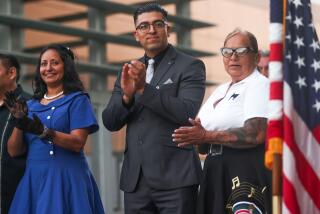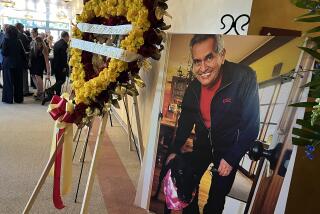First & Spring: Parks and LaBonge, on their way out, are a contrast in styles
Los Angeles City Councilman Bernard C. Parks marked the end of his legislative career miles from City Hall, clutching a jackhammer as it pulverized a broken sidewalk near Martin Luther King Jr. Boulevard.
Parks managed to rip into the city bureaucracy at the same time, saying L.A. officials had failed to spend money put aside for sidewalk repair. Too often, he said, officials have been unwilling to hire less-expensive contractors to get the work done.
That same week, Councilman Tom LaBonge had a far more sentimental send-off, reaching for the tissues at a tearful two-hour farewell on the council floor. His colleagues praised him as “Mr. L.A.,” then called for an intersection in Los Feliz to be named in his honor.
Parks and LaBonge will retire from politics this week, pushed out by term limits. Both worked for decades in city government — LaBonge for nearly 40 years, Parks for 50 — yet their goodbyes were strikingly different. That’s because their approaches to governing were worlds apart.
LaBonge, the larger-than-life backslapper, is known citywide as a boisterous ambassador for all things Los Angeles. Parks, sharp but understated, built a reputation for speaking his mind, consequences be damned. LaBonge, whose district includes Hollywood, is eager to make friends. Parks, a former chief of the Los Angeles Police Department, has not been shy about making enemies.
“Two more different personalities,” said former Councilwoman Ruth Galanter, “are hard to imagine.”
There was a lot of talk this election year about insiders and outsiders, and the question of which is needed more urgently at City Hall. By the end of their careers, LaBonge and Parks, more than most on the council, had come to represent those opposing ends of the political spectrum.
Parks, a fiscal conservative, relished his role of naysayer, going against the grain until he was almost completely isolated from his colleagues. LaBonge, ever the team player, worked amiably on the council floor, reciting the lesson of his high school football coach: move 10 people down the field until there’s a touchdown.
Parks, 71, excoriated his colleagues three years ago for carving USC and nearby neighborhoods out of his South Los Angeles district, part of the once-a-decade process of redrawing council boundaries. After he declined to support Herb Wesson as council president, Parks was bounced from the budget committee.
By contrast, LaBonge took one for the team during the redistricting process, acquiescing as Wesson and his colleagues stretched his district like taffy, from Silver Lake west to Sherman Oaks. Months earlier, he ascended to the council’s leadership team, serving alongside Wesson. This year, Wesson and most other council members backed LaBonge’s chosen successor, his former aide Carolyn Ramsay, who ultimately lost.
On his way out, LaBonge, an avid photographer, sponsored a farewell photo exhibition on the third floor of City Hall — one with a giant image of the councilman at the Farmers Market, beaming and clutching a vanilla ice cream cone. Officials even named a city trash truck after LaBonge — a nod to his drive to remove abandoned furniture. “It’s been a tremendous, uplifting ending,” he said.
Parks, for his part, declined an offer from Councilman Paul Koretz for a City Hall farewell ceremony, telling reporters he didn’t like such rituals. “It makes me nervous when you have to ask people to come and say ‘I appreciate you,’” he said.
Standing near the jackhammer last week, Parks voiced fears that the council, led by Wesson, will do everything in lock step after he leaves. Parks, who has been on the losing end of some 14 to 1 votes, wryly predicted lawmakers would have the “no” button at their desks ripped out once he’s gone.
The zingers were sharper in an interview with L.A. Weekly, in which Parks mocked LaBonge and his colleagues. Using colorful language, he portrayed LaBonge as someone with little interest in policy details.
LaBonge, 61, said last week that he hadn’t read the story but had an idea of what Parks’ message was: “He probably thinks he’s better than everybody.”
Parks, it should be noted, isn’t shying away from his own splashy celebration. On Tuesday, his last day in office, he and his supporters will screen “Biography, Battles and Bernard,” a documentary on his life, at Baldwin Hills Crenshaw Plaza. The two-hour film chronicles Parks’ rise through the ranks of the LAPD and his skirmishes with city employee unions, former Mayor James K. Hahn and many others.
Parks’ son and chief of staff suggested the councilman, a frequent presence on cable news shows, may have another act in store, possibly on national television. “It really does depend on how much he wants to work,” Bernard Parks Jr. said in an email.
LaBonge and Parks did have one thing in common this year — disappointment with this year’s election results, said Dermot Givens, a Los Angeles political consultant. Voters decided they didn’t want Ramsay, LaBonge’s favored candidate, to represent them. They chose self-described outsider David Ryu, whose only support on the council came from Parks.
In South L.A., voters rejected Parks’ favored candidate and went with Marqueece Harris-Dawson, a nonprofit executive who had the backing of Wesson and most of the City Hall establishment. Parks’ constituents concluded that an insider could accomplish more, Givens said.
“The way to get things done is to get eight votes,” he added. “And you’re only going to get eight votes if the council president allows you to get them.”
Both departing council members had detractors. LaBonge’s critics say he lacked focus and a citywide perspective. Parks’ foes called him stubborn and even vengeful. Yet many said they also had complementary roles to play: LaBonge as the enthusiastic cheerleader, Parks as the voice of caution.
LaBonge showed “a palpable love of Los Angeles” that animated every discussion on the council floor, Councilman Mike Bonin said. Parks, on the other hand, provided a skeptical voice on financial matters.
“I rarely agreed with him,” Bonin said, “but it was important to have his voice in the room. It made me think twice about a lot of stuff.”
Twitter: @DavidZahniser
More to Read
Sign up for Essential California
The most important California stories and recommendations in your inbox every morning.
You may occasionally receive promotional content from the Los Angeles Times.











